#moto hagio manga
Text
De mis edits favoritos y por lastima, uno de los más infravalorados. Thomas no Shinzō es lo mejor que me pasó cuando de manga e historias se trata.
Thomas no Shinzō by Moto Hagio.
#shonen ai#year 24 group#moto hagio#manga#thomas no shinzō#il cuore di thomas#the heart of thomas#moto hagio manga#thomas no shinzō edit#mitski#a pearl#hagio moto
6 notes
·
View notes
Text
Eric Fruheling from the manga "Thomas no Shinzou" or "The Heart of Thomas" (1974) by Moto Hagio

#moto hagio manga#hagio moto#moto hagio#year 24 group#thomas no shinzou#thomas no shinzō#thomas no shinzo#heart of thomas#the heart of thomas#il cuore di thomas#thomas werner#eric fruheling#julusmole bayhan#oscar reiser#1999 nen no natsu yasumi#summer of 1999#summer vacation 1999#live action#shounen ai#shounen ai manga#70s shounen ai#70s shounen ai manga#shōnen ai#shōnen ai manga#70s shōnen ai#70s shōnen ai manga#shonen ai#shonen ai manga#70s shonen ai#70s shonen ai manga
6 notes
·
View notes
Text
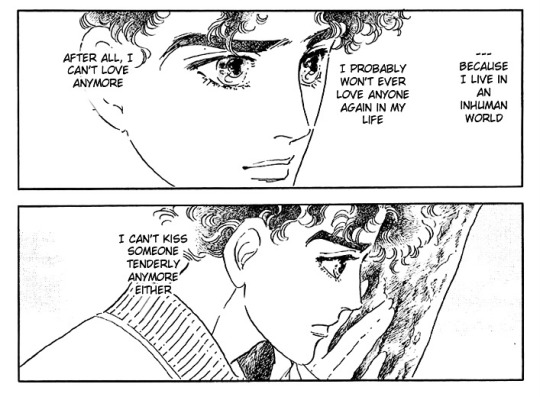
A Cruel God Reigns (残酷な神が支配する) // Moto Hagio
163 notes
·
View notes
Text










残酷な神が支配する/ A Cruel God's Reign
萩尾 望都/Moto Hagio
#mine#collection#my favorite illustrations from the artbook#残酷な神が支配する#a cruel god reigns#萩尾 望都#moto hagio#manga#漫画#artbook
93 notes
·
View notes
Text

#vintage manga#year 24 group#keiko takemiya#moto hagio#the heart of thomas#yaoi manga#the rose of versailles
112 notes
·
View notes
Text
An essay on the theme of children-parent relationships in Hagio Moto's works by Murakami Tomohiko
For years, I avoided reading the essays that were included at the end of bunkoban volumes. Reading Japanese prose felt like a chore to me, to be honest. A too high of a hurdle. And most of the time, the contents went over my head.
That being said, since I started reading them, I've come across some pretty interesting ones. The analysis written by Murakami Tomohiko, manga critic, at the end of Mesh's vol. 3 (Hakusensha Bunko, 1994) was particularly interesting for me. So, I tried my hand at translating butchering it. The author compares the boys in Hagio's manga and their family issues. You can find it below the cut.
If anyone wants to read the original, I can send pics/scans!
Province of children
Murakami Tomohiko
(Manga critic)
For a child, what does it feel like to be neglected by their parents?
Mesh is the protagonist of this story. His mother, elopes with a man when he was young. His father, doubting whether he’s Mesh’s real father or not, drives him away from himself, and places him in a boarding school in the faraway Switzerland. For 12 years of his life, he believes that his mother abandoned him, and his father hates him. It’s not hard to imagine how deep the scars such feelings left in Mesh’s heart are.
Mesh’s mother gave him a girl’s name, “Françoise-Marie.” We do not know if she wanted to have a daughter that bad, but as Mesh was separated from his mother when he was 2, he never knew the truth. But how much of a deciding factor that name became for him, and how it kept bearing heavy on him in his later years, are beyond any doubt.
When Mesh was 12, silver locks started to appear on both sides of his blond hair. After seeing a proof of genetics at work, his father finally recognized him as his own son. But that wasn’t the salvation the he was looking for. When his father shifted the blame on Mesh’s mother’s licentious behavior for doubting his paternity, a new wound was opened on the young boy's heart.
“I won’t say that my mother was a saint. But for a child who lives in a dormitory... a mother something that he needs.”
Thus, in chapter 1, "Mesh,” our protagonist runs away from his paternal home. He is picked up from the streets of Paris by Millon, a young art forger. In the final chapter, “Sure Love and Real Death,” he is reunited with his mother, now living in her homeland of Lorraine. She is mentally instable and still running after the image of her "daughter" who never existed. Mesh is an abandoned child who hates his father so much that he wants to kill him, and who is struggling to break free from her mother’s chains. This manga chronicles his story of breaking free from his parents.
Children discarded by their parents. Children separated from their parents. Such children fumbling their way in their quest to find their personal salvation had been recurring motif in Hagio Moto’s works before Mesh. It is also is the principal theme of this work.
If we look back, in "Bianca (ビアンカ)," she drew a girl who danced away the stress the divorce of her parents caused in a forest. In “Girl on Porch with Puppy (ポーチで少女が小犬と),” she shows us another girl who sees the world through rose-colored glasses. Grown-ups who lost their dreams point their fingers at her, and shoot her with death rays. Or take Emil Bruckhardt from “Snow Child (雪の子).” He was taken in by his grandfather after his parents’ death, who anly accepted for taking the child in if it was a "boy." 12 years of Emil's life was spent by his side, pretending to be a boy. Young Tim from “Poor Mama (かわいそうなママ)” pushes his mother out of the window. He could no longer bear witnessing her misery, as she spent her days sitting at the window sill, gazing off in the distance, and sighing. The free-spirited and brave Eru of the Nobe family in “Red-haired Cousin (赤ッ毛のいとこ)" shows no sign that would make you think that she is an orphan.
They were all children torn apart from their parents.They had to find somewhere to belong, and find it themselves.
The Poe Clan has two boys who were taken away from their biological human parents and turned into vampires, destined to live until eternity. If we think about under the same light, we can say it's their story of trying their hardest to create a pseudo-family for themselves time and time again on their endless journey. The beautiful Poe instalment, "Birds’ Nest (小鳥の巣)," and works like "Heart of Thoma (トーマの心臓)" that followed it, all take place in worlds that have nothing but boys torn apart from their families. It is no coincidence that dormitories were chosen as their settings.
Mesh was published in Shogakukan’s Petit Flower magazine between the 1980 summer issue and 1984 June issue. Mesh was preceded by "The Visitor (訪問者)" in the 1980 Spring issue.
In "The Visitor," we follow a central character from "The Heart of Thomas," Oskar Reiser, during his childhood, before he starts to live at the dormitory. Its main theme is directly connected to that of Mesh. Young Oskar’s parents quarrel over his birth. One day, a single gunshot steals that little boy’s mother from him forever. The one who fired the shot was his father. The boy covers up for his father, and the two set out on journey with no destination. However, Oskar’s father leaves him at the school, of which the principal is an old friend of his and Oskar's real father, and leaves for Southern America alone.
Oskar kept yearning for his father, the father who stole his mother away from him, without begrudging him. He did so, because he had nothing else in life to cling onto. As his father and mother argued about his paternity, the child lost that household as the place he belonged. Young Oskar’s only wish was to be forgiven by his parents, and to believe that he would be acknowledged as the son of that family. To make his wish come true, to beg for his father’s forgiveness, Oskar covers up for his father, the murderer of his mother, and sticks even closer to him.
Our protagonist Mesh is a direct continuation of the image of boyhood we see in "The Visitor"s Oskar Reiser. This link continues until Hagio’s current serialization, "A Cruel God Reigns", and shapes the main plot of her stories. “Children abandoned by their parents” has been present as a principal theme since Hagio Moto's early works. The turning point which made this theme even deeper, might be just this period that connects "The Visitor" to "Mesh."
How did Mesh rationalize his mother giving him a girl’s name? He mostly introduces himself using his alias, “Mesh,” to new acquaintances, and he is very adamant about it. Those who are unaware of the circumstances are left perplexed by that name, and mistake Mesh for a girl. He seems to find that amusing deep down. He crossdresses and appears on stage, and he is approached by homosexual men. Both makes him feel uncomfortable. Yet, he doesn’t seem to have a the willpower to resist.
Actually, I have also experienced something similar. So I believe I understand how Mesh feels a little.
When I was roughly Mesh’s age, I was a child who liked to act like a girl. In high school, I put a tablecloth on my desk in class, made flower arrangements with artificial flowers in an empty wine bottle instead of a proper vase, and listened to lectures while holding a stuffed doll. Mine was quite a free-minded school, and it was an age when all kinds of rebellious acts were "in." But still, when I think back upon it, what I did seems outrageous to me. Maybe I was just too eccentric, which is why my teachers never said anything to me.
I was jealous of my mother’s colorful outfits. I often borrowed and wore them. Her sleek green trench coat and tank top with pink and white borders from Kamoi Youko’s underwear brand, Tunic, were my favorites. I once even made a dress for myself. I chose the fabric with my girlfriend, did the basting at her place, and she sewed it for me. She tagged along because she found it to be fun, but I’m certain that she was weirded out.
I am still a sucker for stationary and fancy items girls would like. If I go to Sony Plaza or American Pharmacy, I am confident that I can spend half a day there. There aren’t many fathers who would go to buy picture books and plushies for their kid, but get carried out and just buy whatever they want.
Putting it like that makes me sound like a man with perverse hobbies, but sadly, I am not such inclined. I have never felt attracted to men, and never have I ever wanted to be a woman. My interest in crossdressing had something different in it. But I am interested in feminine, rather, “girlish” things, but it only means that I am slightly different than your average, common man.
That being said, my mother’s influence on me cannot be ignored. When I finished my dress, it was her who was the happiest and told me to wear it and take a little tour outside. During my freshman year in university, she was the one who lamented the most when I cut my hair that was reaching my butt, and made a hairpiece with my hair for me. When I was in grade school, I once trimmed my eyelashes with a pair of scissors because they were getting in the way when I was using the microscope. I remember her being frustrated to the point of bursting into tears, and getting so angry with me.
I believe it was my mother who slowly created my very particular aesthetic sense by praising things like long eyelashes, lustrous, straight hair, a slender physique which becomes female school uniforms. All things that would be the charm points of budding young girls, and she did it at every chance. I am an only child, and have no siblings. When I was a child, my mother once asked me if I wanted to have little brothers or sisters. I told her that I would like to have an older brother, which seemed to perplex her. Maybe my mother wanted to have a daughter. She could be looking for the shadow of the daughter she never had in me.
I don’t really know the truth of it. Maybe she just said that I looked like a girl just to express how cute her son was, without putting much thought into it. But the words she said, words I have no recollection of, very likely had a huge impact on me and awakened something deep inside my soul. My personal preferences took shape around that idea, and before I knew it, it seeped into my entire being.
My mother was a beautician, and was often away from home on business. After she opened her own store, she was always busy with work. But that was all there was to it, and it was not like she had left me, or we were separated by death. And it never became a reason for my parents to hurt or to oppress me. I can say that overall, I grew up in a your rather ordinary, warm household. I still started to shape my very own personality, alongside the one my parents took part in creating. Then how about a child who feels hated, or abandoned by his parents? How would he feel? To heal the wounds he got from his parents and to ail himself, would he acknowledge it all, and accept everything? Or would complete denial be his only choice?
That's why Mesh wanted to kill his father and break free from his mother’s curse. While he wanted to be freed from his mother’s desire to have a daughter, in some corner of his mind, he was curious about what would happen if he complied. Maybe that’s what made him stand on the stage as a woman, and occasionally enjoy being photographed as one. Maybe that’s why he sometimes shut up and endured it when men treated him like a girl.
Maybe fulfilling his mother’s wish meant securing a place in her heart for him. It might have been a self-defense mechanism — a feeling that only children abandoned by their parents know. That’s why when he faced her, and saw that his mentally ailing mother would never accept him, a boy, Mesh said: “Just what does Marché want? How can I get close to what she wants? What should I become? Marché’s dreams, and my dreams... If only I knew...”
“A thousand pairs of scissors. Scissors that cut and mince. I could have become a flower, a bird, a daughter... I could have become anything you wanted. I could have died a thousand deaths if you wished for it.”
We do not know the reasons why she wanted to have a daughter. No matter what they might be, accepting them as they are, that complete subordination, is an expression of his willingness to bend to his mother's will. What does it feel like to hear “I hate this child” from a mother who can’t even tell his son apart? But Mesh even accepts his mother trying to stab him with shears without saying a single word.
Where does Mesh’s determination, which is almost commendable, come from? What steeled his resolve so? I think it was something closer to despair, rather than a wish to be delivered. Mesh’s hatred and his murderous thoughts towards his father are the two sides of the same coin. Killing his father, who hated both him and his mother, and accepting death by the hands of the mother who forgot her own son: They are actually one and the same. Thus, the child abandoned by his parents try to erase his ties to them. By resetting everything, he tries to make it as if he never existed.
There is probably just one thing he’s trying to say with his behavior.
"I’m sorry.
"I couldn’t be the child you wanted.
"I couldn’t meet your expectations.
"I’m sorry that I was born..."
In “The Visitor”, in the middle of his endless journey with his father, Oskar says these words time and time again: "I will be a good child. I won’t talk about my mom anymore. I’m sorry." Then he obliges his father by starting to live in a dormitory, and waits for his father to be back from South America. This must have been no different than choosing death for Oskar, a child who wanted to be the son of a warm household.
When he doesn’t resist his mother’s attempt to kill him, something inside of Mesh shattered to pieces. He arrives at Paris train station with his broken hopes as his baggage, and he catches a glimpse of his father boarding a train. His father, who acknowledged him as “his son who shares the same blood as him” without so much as a thought about how that made Mesh feel. All Mesh can do is to stand there, motionless. Even if that's the only place he can come back to now.
All children need a place they belong. A place where they feel they can just “be.” Children do not belong to their parents, or other adults. No one shall undermine their right to self-determination. Mesh shows us how much hardship children have to endure, and the sacrifices they have to make when grown-ups forget this fact.
#村上知彦#murakami tomohiko#tomohiko murakami#hagio moto#moto hagio#萩尾望都#24年組#year 24 group#classic manga#vintage shoujo#retro shoujo#manga analysis#manga essay#heart of thomas#トーマの心臓#メッシェ#mesh#訪問者#visitor
65 notes
·
View notes
Text






残酷な神が支配する / A Cruel God Reigns, Hagio Moto
77 notes
·
View notes
Text
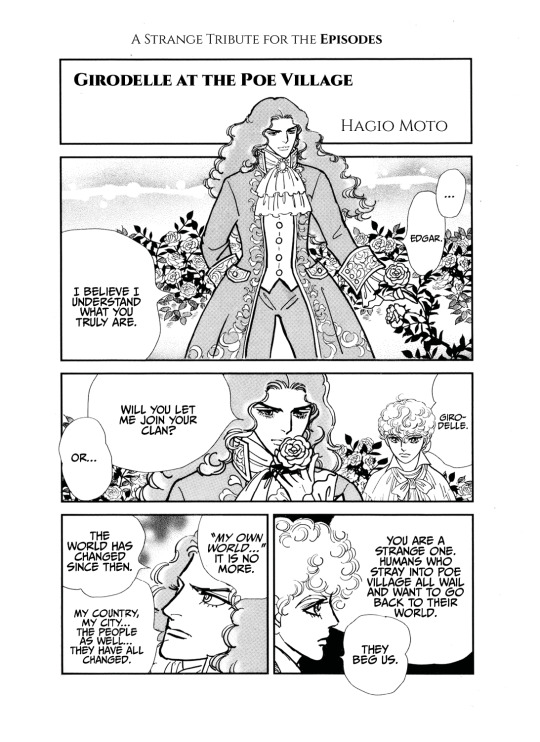
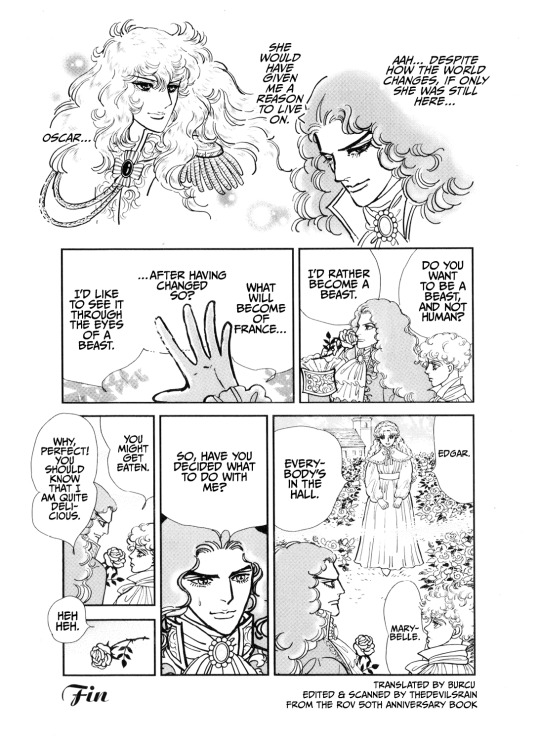
rose of versailles 50th anniversary book
tribute comic by hagio moto starring girodelle and edgar (the poe clan). translated by the lovely @asnowperson and edited by me ♡
#rose of versailles#the poe clan#rov50#victor clement de girodelle#edgar portsnell#scanlations#my scans#hagio moto#shoujo manga#vintage shoujo#mine
118 notes
·
View notes
Text
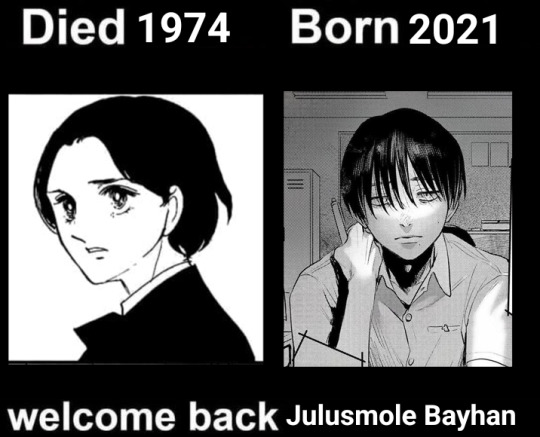
#thats basically the same guy#yoshiki is only in a horror manga#Yoshiki and Hikaru could be in a moto hagio manga and would not changed that much lol#the summer hikaru died#hgsn#hikaru ga shinda natsu#heart of thomas#thomas no shinzou#julusmole bayhan#yoshiki tsujinaka#Tsujinaka Yoshiki#samwichitos misc
63 notes
·
View notes
Text
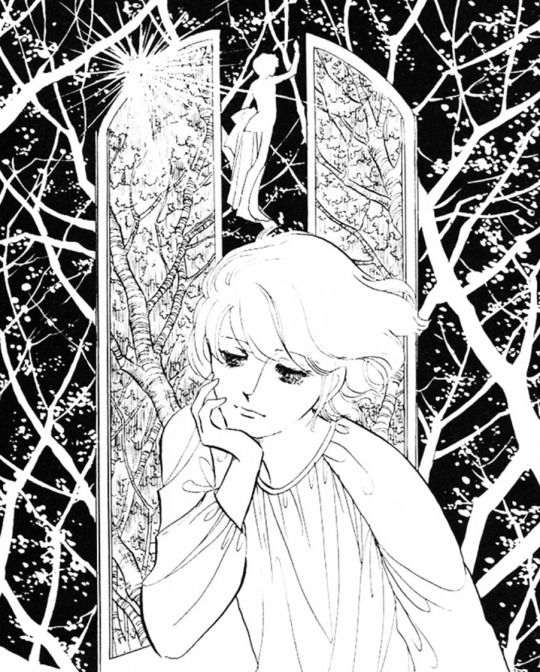
Also this is a very lovely illustration . I freaking love this guy he rocks so hard😭😭 allan heads rise up
#the poe clan#poe no ichizoku#allan the poe clan#year 24 group#vintage manga#shoujo manga#70s manga#hagio moto
55 notes
·
View notes
Text
greetings vintage shoujo manga fans!
something I have wanted to do for a while now is create a database / wiki which documents as close to every single pre-1990s shoujo as possible, as every english-language manga database is severely lacking in this regard... and I have started it! however, because this is a giant project, I need to inform as many people who may be interested in contributing as possible. I have created a Miraheze wiki to host the content, and am very slowly adding the information I have accrued to the pages. (Its completely bare bones right now, I'm basically just testing things)
Please comment or message me if you have any interest in helping out with this as I want to spread the word as much as I can! If it's just me editing I'll literally never add everything at this rate lol.
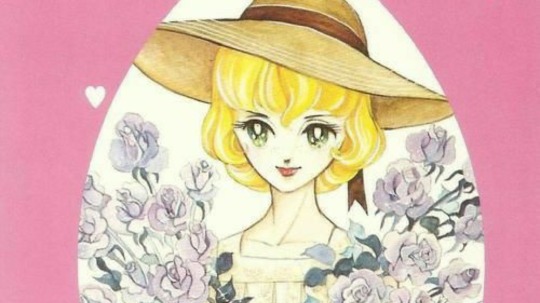
(obligatory keiko takemiya illustration to catch your eyes sorry)
I mainly need help with adding the basic information to the articles, biographical information, plot summaries, etc, but once again, absolutely anything helps and I would really appreciate it if anyone would be interested in contributing to this wiki.
manga and mangaka tags added for visibility :)
#me.txt#1970s manga#vintage manga#vintage shoujo#keiko takemiya#moto hagio#riyoko ikeda#kaze to ki no uta#versailles no bara#thomas no shinzou#oniisama e#glass no kamen#shoujo manga#shoujo anime
391 notes
·
View notes
Text
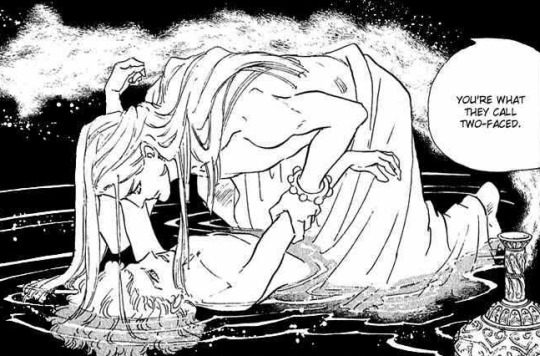
Jeremy and Ian scene from A Cruel God Reigns | they make me so miserable
#a cruel god reigns#jeremy butler#kaze to ki no uta#zankoku na kami ga shihai suru#moto hagio#70s manga#80s manga#vintage manga
164 notes
·
View notes
Text
Hagio Moto's Egg Stand (1984)
After seeing the Demian reference in this one shot, I knew I had to translate this. And with the help of my friends with good taste, CiceroCiceronis and shielshi, we present you a movie-like story by Hagio.

DDL
MangaDex
This manga was published in Hagio's Houmonsha (訪問者, 1995) bunkoban volume.
Special thanks to Box Head Idiot, who gave me the chance to translate this beautiful story. I hope Hagio fans out there aren't missing their scanlations on MD!
PS. Egg stand received a stage play in 2017. You can read about it here:
#moto hagio#hagio moto#萩尾望都#egg stand#エッグ・スタンド#scanlation#one shot#80s shoujo#retro shoujo#vintage shoujo#WW2#la résistance#paris#historical manga#hermann hesse#demian#year 24 group#24年組
85 notes
·
View notes
Text

A Cruel God Reigns (残酷な神が支配する) // Moto Hagio
133 notes
·
View notes
Text
That strange and beautiful relationship between the fandoms of Kaze To Ki No Uta 🤝🏻 The Heart of Thomas 🤝🏻 The Poe Clan 🤝🏻 Black Butler
I guess because they are united by abused homeless children with religious trauma.
#year 24 group#alan twilight#edgar portsnell#shojo manga#the heart of thomas#kaze to ki no uta#la balada del viento y los árboles#thomas no shinzō#the poe clan#poe no ichizoku#moto hagio#the poem of the wind and the trees#keiko takemiya#yana toboso#serge battour#gilbert cocteau#black butler#kuroshitsuji#ciel phantomhive#sebastian michaelis#alois trancy#julusmole bauernfeind#julusmole bayhan#トーマの心臓#黒執事#風と木の詩#ポーの一族#Oskar Reiser#yaoi#erich fruhling
86 notes
·
View notes

